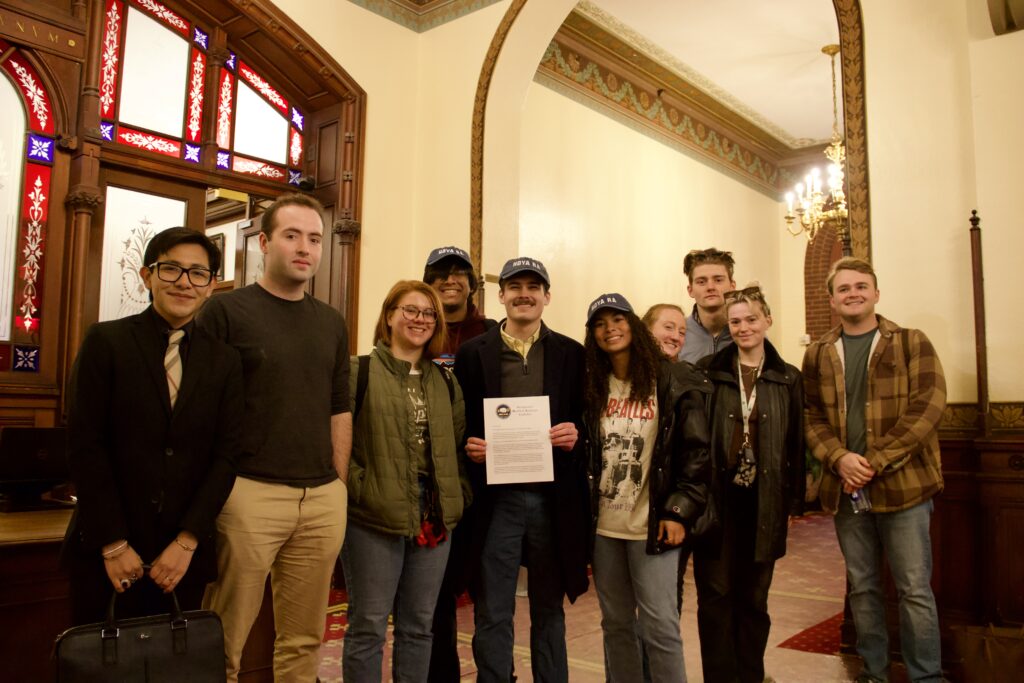The Georgetown Resident Assistant Coalition (GRAC) announced their intention to unionize under OPEIU Local 153 via a press release on March 22. Their reasons for unionizing include demands for equitable and just compensation, as well as a formal grievance process in response to the mistreatment of some RAs by management. Organizers began working toward unionization efforts in February, and the majority of RAs have signed a petition in favor of forming a union. Under Georgetown’s Just Employment Policy, “all working members” of the Georgetown community have the right to organize.
The process for forming a union requires a group of workers, in this case Georgetown RAs, to first identify a union to represent them, in this case OPEIU. They then must provide proof to the National Labor Relations Board (NLRB) either via union cards or petitions that at least 30% of the workers are in favor of a union election, and finally a simple majority of members must vote in favor of unionizing. Following this, they can then negotiate their first contract with their employer.
“We are requesting voluntary recognition at the university. It’s important to emphasize that our effort has garnered over 80% of support from RAs, not simply 80% of RAs have signed a statement wishing to see things change, but 80% of RAs have signed a statement asking to be represented by a union,” Sam Lovell (CAS ‘25), an organizer with GRAC, said in an interview with the Voice. GRAC delivered this petition to President Degoia’s Office at around noon, shortly before they released their official statement.
“We deeply value the contributions of Resident Assistants (RAs) to our living and learning community and are reviewing their request to be recognized as a collective bargaining unit,” a university spokesperson wrote in an email to the Voice.
Were the university to voluntarily recognize RAs it would preclude the need for a union election, which otherwise would be held in mid to late April. RAs have chosen to unionize with OPEIU, the Office and Professional Employees International Union, because they have extensive experience organizing RA unions, including at Emerson College, Wesleyan University, Tufts University, Rensselaer Polytechnic Institute, and the University of Pennsylvania.
 Contributed by Izzy Wagener
Contributed by Izzy Wagener
This is not the first time Georgetown RAs have attempted to unionize. In 2019, Andrew Adams (NHS ’20) and Chad Gasman (COL ’20) attempted to form a union under the American Federation of Teachers, although that effort never went fully public. It never materialized, in part because the university caught wind of the effort before it went public and promised the incoming crop of RAs an improved meal plan, which according to Adams and Gasman quelled unionization efforts.
Equitable compensation is a key demand of organizing RAs. Currently, all Resident Assistants (RAs) are employed by the Office of Residential Living at Georgetown, and as part of this employment they receive a compensation package that covers their housing and meal plans, equal to roughly $20,000. Functionally, however, this compensation is categorized as a form of financial aid and does not stack on top of existing financial aid a student may receive, meaning that for students who receive financial aid, the $20,000 RA benefit is often only nominally reflected in their bill.
“There’s a difference of $850 between my financial aid package and my RA benefits, so it’s just $850 less than I’m expected to pay at the beginning of each semester. And I don’t qualify for work study on campus because my RA benefits cancel those out. It’s a very inequitable kind of method of compensation,” Becca Haley (CAS ‘25), an RA in Ryan-Hawkins Hall, said to the Voice.
For many RAs who are awarded financial aid, this results in them seeing very little of the compensation that their peers who qualify for little to no aid receive.
“Students who don’t receive financial aid, they get 20,000 taken off their bill, and that’s a really tangible difference. But for students who do receive financial aid, they often don’t actually see any change in that final bill that is due at the beginning of each semester,” Haley said.
GRAC is demanding the university implement “an indirect compensation package with an equivalently large, direct stipend” in order to address the fundamental inequities with the current compensation structure. They also want the university to pay RAs for the many hours of unpaid training they complete every semester.
“A stipend would help, to my understanding, circumvent some of the issues with financial aid because it would be considered outside income, not like a financial aid award,” Lovell said. This approach has been used successfully by RA unions at other universities.
“Other universities who have unionized their RAs have been able to restructure compensation in the form of a direct stipend. So for example, I believe at Barnard College, they have restructured compensation such that it is a direct stipend and everybody makes the same amount,” Lovell said.
Mistreatment is a second key category of demands that GRAC hopes will be addressed by the formation of a union. RAs described being spoken to unprofessionally by their supervisors and said that favoritism negatively impacts their ability to do their jobs.
“I think that the fact that your housing, your job and for many, your ability to attend college for yourself, being dependent on whether you’re liked or not by your supervisor, by CD, is something that is fundamentally oppressing,” Ulises Olea Tapia (SFS ’25), an organizer with GRAC, said.
RAs also described CDs who were purposefully punitive of both residents and RAs, often putting them in difficult and inappropriate situations. They said that policies are enforced unevenly across residential living communities, leading RAs in some communities to be disciplined, either via written or verbal warnings, for very minor infractions.
“There are some communities where RAs are getting written up for being three minutes late to a staff meeting, or submitting a duty log which we must submit every time that we have completed a note on duty 10 minutes late, and these kinds of infractions,” Lovell said.
Issues with uneven policy enforcement and punitive CDs have also led to cases that GRAC describes as wrongful termination. In some cases, RAs have not been renewed for the following year, for mistakes they did not make, as was the case of Izzy Wagener (SFS’ 26), an RA in Southwest Quad.
“I myself was told that I would not be rehired due to mistakes that were later revealed to be the fault of professional staff in the Office of Residential Living,” Wagener wrote in the press release. “Advocating for myself, and eventually regaining my job, became solely my burden to bear. Management has made it clear that we’re dispensable to them; that’s why our contract stipulates that RAs ‘may be terminated by… the university at any time without notice or cause,’”
Disclaimer: Izzy Wagener is a member of the Voice.
RAs are also demanding that the university address the challenges they currently experience, including those caused by difficult and inconsistent staffing ratios.
“We’re also looking at staffing ratios. I can tell you that. Me personally, I oversee 114 residents, someone else in my own community oversees only 35,” Olea Tapia said.
GRAC is also seeking increased resources for RAs who often act as ‘first responders’ to a variety of emergency situations ranging from incidences of suicidal ideation to sexual assault to alcohol overconsumption. Elise Merchant (CAS ’25), an RA in the East Campus and organizer with GRAC who sits on Student Staff Council, said colleagues have come to her seeking help from the council when they’ve lacked university support.
“I do work with someone who, when there was a serious issue regarding a resident and something happened, they were not given the support and resources by Residential Living that they needed. There was no direct follow up from a CD,” Merchant said.
Organizers expressed that forming a union was not their first choice, rather it is the consequence of having exhausted other avenues for addressing their demands. They have tried formal channels, including the Student Staff Council, which both Merchant and Olea Tapia sit on.
“RAs have been engaged with a long-standing dialogue with residential life here at Georgetown. They’ve been engaged with dialogue with other campus partners, including the Office of Student Ombuds, including Human Resources to talk about these issues, and unfortunately, those haven’t been resolved with those traditional mechanisms,” Lovell said.
Nor does GRAC see this move as placing them in opposition to the university, rather they hope it will be a way to pursue the mission that they and the university both share: serving their residents.
“We don’t seek to be adversarial. Having a union is not inherently adversarial. We have been in dialogue with the Office of Residential Living for many, many months, and we will continue to engage with dialogue with the Office of Residential Living.” Lovell said.
RAs that spoke with the Voice expressed that this move has taken a lot of thought, consideration, and courage. They described feeling fear of retaliation or losing their jobs, for speaking out publicly.
“I am scared. I am scared for my job because doing this means that I could be out of housing and given the timeline that they give you. If I was to be fired, I would have three days to move out of my apartment,” Olea Tapia said. “Imagine being told: ‘Hey, not only are you out of a job, but you’re also out of the house, and you have three days to vacate your space.’”
RAs have a confidentiality clause in their contracts that states that they will not speak to: “any media regarding questions or comments pertaining to my role and work within the Office of Residential Living unless provided express permission to do so.” According to the NLRB, workers have the legally protected right to speak to the media “about problems in your workplace.”
All RAs quoted in this article explicitly stated that they were not speaking on behalf of Residential Living and believed they were complying with the guidelines outlined by NLRB, yet nonetheless, many were still nervous about facing retribution for their organizing.
“I like to trust that this is just a fear, and that it will not come to fruition because if me or any of my colleagues who are organizing were to be fired or if we received any retaliation, that would speak a lot about this institution, and again, I still like to believe that Georgetown is a good institution,” Olea Tapia said.
Ultimately, RAs see unionizing as necessary for their own protection, but also as a key part of continuing to serve their residents.
“We have decided to take collective action, because we love our job, because we truly do love helping our residents and, and you know, because we believe in a better Georgetown,” Olea Tapia said.







